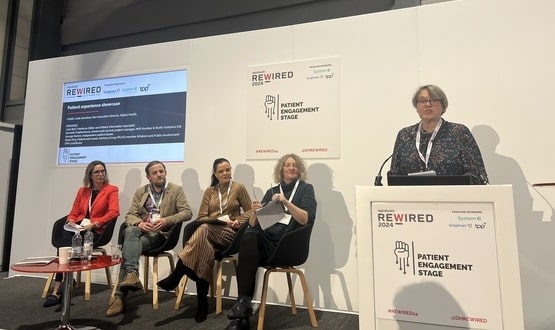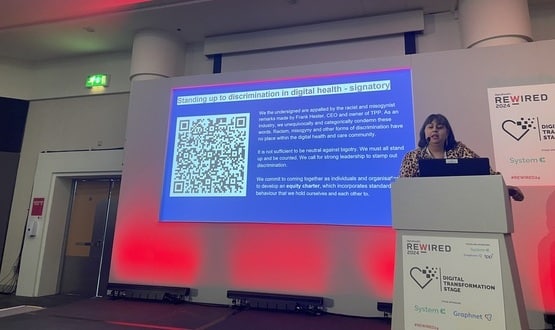Addressing gender imbalance will take time but change needs to start now
- 5 May 2020

Gender imbalance in digital health has long been debated and Katie Shevlin from Inhealth Communications looks into why addressing the issue will take time but has to be driven now.
With the recent advances in AI and other technologies, it is an exciting time to be part of the UK’s digital health sector. And yet, last year just a quarter of the jobs in AI and specialist technology were filled by women – the lowest proportion in two decades. The number of women in the STEM industries is increasing, but the pace of growth has slowed. Since 2009, the tech roles filled by women has flatlined at just 16 per cent.
There are myriad reasons for this underrepresentation, many rooted in systemic issues not unique to health tech and undoing these will require a big shift in culture. There are steps that can be taken today, however, towards overcoming the barriers and rebalancing the sector.
The digital health and technology sector has expanded rapidly in recent years, leading to an abundance of new areas of research and development and a demand for different skills. Yet, there is a distinct lack of visibility around the career options now available, including many that don’t require technical ability.
Traditional career exposure
When making choices about a potential career path, girls and young women are underinformed about what a career in health informatics or med tech could look like, says Dr Amanda Lamb, former deputy director of Connected Health Cities and chief executive of Applied Health Insights.
“Children are often only exposed to traditional careers, which leaves a lot of gaps,” she says.
Dr Laura Bonnett, a medical statistician at the University of Liverpool and recipient of a 2019 Women in Data award, agrees: “When I was a pupil, I had no idea that you could have a job doing maths every day.
“Machine learning and artificial intelligence have opened up a lot of career opportunities, but we need to change the perspective that they are computer science areas – there is actually a huge amount of maths and data science involved.”
Banishing early on the stereotypical perception of a career in health tech will be key in encouraging the next generation to purposefully enter the sector, then. But even those that do break into the sector struggle to rise to senior positions.
Mid-career breaks are a particular issue in research-focused posts, says Dr Bonnett. “When you are considered for various positions, you’re judged based on your research output and your grant income, which presents difficulties if you’ve been on maternity leave.”
Addressing the issue
The Office of AI is helping address this issue – in June 2019 it announced £13.5 million funding for 2,500 AI conversion degrees, with 1,000 scholarships for individuals from underrepresented backgrounds.
This initiative is unique, says Maxine Mackintosh, a postdoctoral research associate specialising in applying machine learning to NHS data sets, and co-founder of One HealthTech.
“It has identified that there are lot of people, particularly women, who are mid-career and want to get into tech, but moving laterally requires substantial investment of money and time to retrain, and often isn’t feasible,” she says.
“The funding is of course open to everyone, but specifically targets pain points for women, who are more likely to have a career break.”
Fair and open recruitment processes
A fair and open recruitment process is crucial for attracting more women, and easy to implement. A large-scale study of British recruitment adverts revealed that gender bias starts before a candidate is even hired, with stereotyping embedded into job descriptions.
Shortlisting candidates without names and ages ensures the process is blind to gender and ethnicity.
Thinktank Reform uses a diversity and inclusion tool called Applied, which allows the first phase of recruitment to be conducted exclusively through questions, without a CV or cover letter. Eleonora Harwich, director of research and head of tech innovation at Reform, says the organisation also asked applicants to exclude the name of their university.
“Since we’ve had this recruitment process in place, we have actually had better candidates,” she says.
Research has shown that the list of requirements on a job advertisement can affect the gender balance of the applicants, with men likely to apply if they meet 60 per cent of the listed job requirements but women likely to apply only if they meet 100 per cent.
For this reason, companies need to think carefully about how job advertisements are tailored. Dr Lamb spends a lot of time trying to get a job description right. “I really question the language I use and make sure the list of requirements isn’t overwhelming.
“We also consider whether it is necessary to have a degree in the field. I’ve worked with some brilliant CIOs and CTOs who don’t have a computer science degree, but their experience means they are better suited for the role compared with someone from a traditional background.”
Peddling change
Some companies and organisations in the sector are already endeavouring to build an inclusive and diverse workplace. Healthcare intelligence company Dr Foster is dedicated to ensuring equality amongst staff, with 50 per cent of its roles filled by women and almost half its management team. Venus Simbulan-Fenwick, director of marketing at Dr Foster, says: “We try hard to address the gender imbalance and our culture reflects this, with greater career flexibility when needed. We are also celebrating the achievements of successful female leaders in the sector with our new Inspirational Women campaign, to encourage the next generation to enter the sector.
“It is so important for young women to see people like themselves represented, so that they know the sector is a place they belong, too.”
The value of female role models is well-evidenced, with girls more likely to consider a career in STEM if they have one. Additionally, a study commissioned by CWJobs found that in the tech sector role models are more important for women – 64 per cent of women were inspired by a role model to pursue their career compared with 47% of men.
There are also a number of networks encouraging inclusivity and diversity in the sector, such as Women in AI, a community-driven initiative working towards gender-inclusive AI.
Power of communities
The One HealthTech community was founded in 2015 and now has more than 13,500 members globally. It was originally founded to help women thrive in the field but has now grown to include all minority groups.
Maxine explains: “One HealthTech was originally borne out of the fact that healthcare is overwhelmingly female, yet health tech is really lacking in women. This has now expanded into a more inclusive, intersectional approach to diversity.
“If you create an inclusive environment, everyone benefits.”
A mix of skill sets and backgrounds not only benefits the sector, it is also necessary to developing non-biased health tech that serves everyone. Dr Bonnett says: “It’s not just about gender but about diversity and having people from different backgrounds and cultures. People bring different things to the table and we need a diverse skill set to maximise what we do.”




